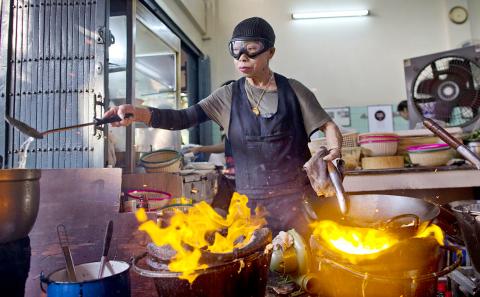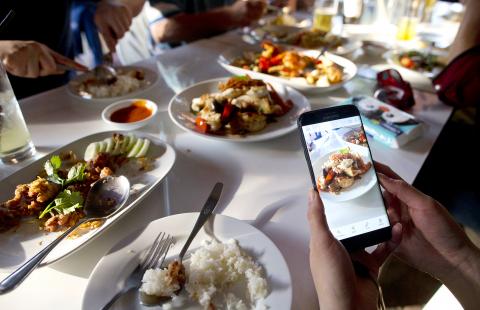After spending more than three decades cooking in an unassuming outdoor kitchen, a wok-wielding, goggles-wearing Thai chef has been propelled to international culinary stardom by having her restaurant awarded a Michelin star.
Supinya Jansuta, better known as “Jay Fai,” is among 17 Bangkok-based chefs whose venues received the coveted honor from Michelin in a guidebook released last month its first foray into the country.
Jay Fai, as her restaurant is also known, is often featured in foreign travel guides but is mostly shunned by Thais for its high prices of what is generally considered cheap local food.

Photo: Ap
But a closer examination of the 72-year-old chef’s dishes reveals an abundance of fresh seafood and prime ingredients.
“The No 1 thing with Jay Fai is people say it’s too expensive,” said Oliver Irvine, editor of the English-language weekly BK Magazine, which regularly critiques Bangkok’s food scene.
“This is an old classic hole-in-the wall place which charges 800-1,000 baht (US$24 to US$31) for its famous crab omelet, which is nowhere near street-food prices. But when you cut that thing open, it’s literally bursting with the freshest crab in the whole city.”

Photo: Ap
Jay Fai is the only restaurant in the Bangkok guide listed under the “street food” classification to receive a star.
“Jay Fai is a place that both taxi drivers and foodies wax lyrical about and it’s easy to see why,” the Michelin guidebook says of the restaurant.
Bangkok is renowned for its street food, with cart-wielding vendors selling everything from Thailand’s signature noodles to spicy tom yum goong soup.
The stalls, with their metal folding tables and rickety plastic stools, serve as a gastronomic go-to for budget-conscious locals and adventurous tourists alike.
In recent months, however, officials in the military-ruled country who see street food as an illegal nuisance have warned hawkers to clear out of some of the city’s neighborhoods.
While Jay Fai is one of 14 Bangkok restaurants to receive a single star, none got three stars, the highest Michelin honor. Three were awarded two stars — the Indian restaurant Gaggan, French venue Le Normandie and European establishment Mezzaluna.
Following the lead of several other Asian nations, Thailand’s government earmarked US$4.1 million last year to commission five years of Michelin Guides dedicated to the country.
Michelin says the Bangkok guide was “solely, independently and anonymously” produced by its team of critics.
Jay Fai said she was happy about receiving the Michelin honor, but questioned why it came so late in her career.
“I’ve been cooking for 30 to 40 years, so I don’t know why I’ve only just got it,” she said. “I’m happy that they’re starting to recognize Thailand and Thai chefs.”
“I hope more Thai people will win the award next year, and they don’t just give it to Jay Fai again,’’ she said as she expertly flipped and tossed vegetables in a flaming wok.
Since receiving the accolade, Jay Fai’s once relatively quiet restaurant has been busier than ever. Her shop is open from 3pm to 2am, but many people start queuing up well before opening time. By afternoon on most days, a “full house” sign is hung up, indicating that no further customers can be accommodated.
After waiting in line for over two hours, David Goldman, a tourist from Los Angeles, left the restaurant satisfied.
“The food was really fresh. It was probably the best Thai food I’ve ever had,” Goldman said. “The only advice I have for anyone coming here is bring a book” given the long wait, he added.

JUNE 30 to JULY 6 After being routed by the Japanese in the bloody battle of Baguashan (八卦山), Hsu Hsiang (徐驤) and a handful of surviving Hakka fighters sped toward Tainan. There, he would meet with Liu Yung-fu (劉永福), leader of the Black Flag Army who had assumed control of the resisting Republic of Formosa after its president and vice-president fled to China. Hsu, who had been fighting non-stop for over two months from Taoyuan to Changhua, was reportedly injured and exhausted. As the story goes, Liu advised that Hsu take shelter in China to recover and regroup, but Hsu steadfastly

Taiwan’s politics is mystifying to many foreign observers. Gosh, that is strange, considering just how logical and straightforward it all is. Let us take a step back and review. Thanks to the Chinese Nationalist Party (KMT) and the Taiwan People’s Party (TPP), starting this year people will once again have Christmas Day off work. In 2002, the Scrooges in the Democratic Progressive Party (DPP) said “bah, humbug” to that. The holiday is not actually Christmas, but rather Constitution Day, celebrating the enactment of the Constitution of the Republic of China (ROC) on December 25, 1947. The DPP and the then pan-blue dominated legislature

Focus Taiwan reported last week that government figures showed unemployment in Taiwan is at historic lows: “The local unemployment rate fell 0.02 percentage points from a month earlier to 3.30 percent in May, the lowest level for the month in 25 years.” Historical lows in joblessness occurred earlier this year as well. The context? Labor shortages. The National Development Council (NDC) expects that Taiwan will be short 400,000 workers by 2030, now just five years away. The depth of the labor crisis is masked by the hundreds of thousands of migrant workers which the economy absolutely depends on, and the

If you’ve lately been feeling that the “Jurassic Park” franchise has jumped an even more ancient creature — the shark — hold off any thoughts of extinction. Judging from the latest entry, there’s still life in this old dino series. Jurassic World Rebirth captures the awe and majesty of the overgrown lizards that’s been lacking for so many of the movies, which became just an endless cat-and-mouse in the dark between scared humans against T-Rexes or raptors. Jurassic World Rebirth lets in the daylight. Credit goes to screenwriter David Koepp, who penned the original Jurassic Park, and director Gareth Edwards, who knows